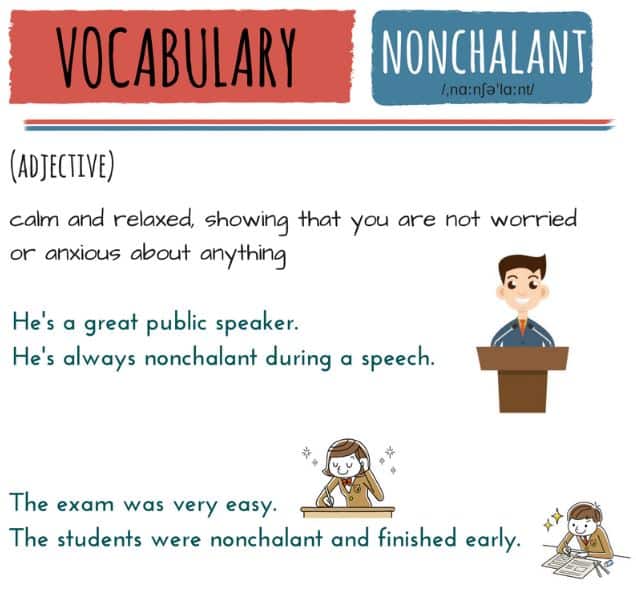Nonchalant describes someone who is calm, unconcerned, and seemingly lacking in excitement or interest. Here’s everything you need to know about Nonchalant Meaning & Definition and how to use it in a sentence.
ALSO READ: What Does PTY LTD Mean In South Africa? PTY LTD Meaning Explained
What Is Nonchalant Meaning?
The term “nonchalant” refers to an adjective used to describe someone or something that appears calm, relaxed, and unconcerned, especially in situations where others might expect a different reaction. A nonchalant attitude often suggests a lack of interest, enthusiasm, or emotional involvement. Nonchalant individuals typically remain composed and unfazed, even in situations that may typically evoke excitement, worry, or enthusiasm in others. This demeanor can sometimes be perceived as cool or indifferent, depending on the context.
Examples Of Nonchalant In A Sentence
Here are some examples of how to use “nonchalant” in a sentence, showcasing both positive and negative connotations:
Positive Connotations:
- Confident Demeanor: Despite facing a packed stadium, the experienced tennis player served with a nonchalant ease.
- Unflappable Under Pressure: The firefighter calmly entered the burning building with a nonchalant air, reassuring the onlookers.
- Cool and Collected: The detective listened to the suspect’s wild story with a nonchalant expression, giving away nothing.
Negative Connotations:
- Dismissive Attitude: She gave a nonchalant wave of her hand, dismissing his concerns without a second thought.
- Lack of Enthusiasm: The student mumbled a nonchalant answer when questioned about his college plans, revealing a lack of direction.
- Feigning Indifference: Though she secretly harbored a crush, she acted with a nonchalant coolness towards him.
Neutral Connotations:
- Casual Demeanor: Dressed in jeans and a t-shirt, he strolled into the meeting with a nonchalant air.
- Unfazed by the Situation: The child yawned with a nonchalant shrug, seemingly unconcerned about the commotion around him.
- Simply Uninterested: Despite the delicious aroma, she gave the plate of food a nonchalant glance and pushed it away.
Frequently Asked Questions About Nonchalant
Here are some frequently asked questions about “nonchalant”:
What does it mean to be nonchalant?
To be nonchalant means to appear calm, relaxed, and unconcerned, especially in situations where others might expect a different reaction. Nonchalant individuals typically display a lack of interest or emotional involvement in their demeanor.
Is being nonchalant a positive trait?
It can be perceived as positive in certain situations, such as maintaining composure under pressure or remaining calm in stressful circumstances. However, it can also be seen as negative if it reflects a lack of empathy or concern for others’ feelings.
How can I become more nonchalant?
Developing a nonchalant attitude involves practicing relaxation techniques, such as deep breathing or mindfulness meditation, to stay calm in stressful situations. It also involves adopting a more laid-back mindset and learning to let go of worries and anxieties.
Is nonchalance the same as indifference?
Nonchalance and indifference are related but not identical. Nonchalance refers to appearing calm and relaxed, while indifference implies a lack of interest or concern altogether. Someone who is nonchalant may still care about the outcome of a situation, but they appear unaffected by it.
Can being nonchalant help in social situations?
Being nonchalant can sometimes help in social situations by projecting confidence and ease. However, it’s essential to balance nonchalance with empathy and genuine interest in others’ experiences and feelings.
Is nonchalance a learned behavior?
Nonchalance can be both innate and learned. Some individuals naturally have a calm and laid-back disposition, while others may develop nonchalant attitudes over time through practice and experience in managing stress and emotions.
How do I avoid coming across as too nonchalant?
While nonchalance can be beneficial in certain situations, it’s essential to be mindful of others’ feelings and the gravity of the circumstances. Avoid appearing aloof or dismissive by showing empathy, actively listening, and engaging appropriately in conversations and interactions.
These are just a few common questions about nonchalant behavior and attitudes.
Conclusion
In conclusion, “nonchalant” meaning describes someone who is calm, unconcerned, and seemingly lacking in excitement or interest. It can be a positive trait, signifying confidence or composure under pressure. However, it can also be perceived negatively if it comes across as dismissive, disrespectful, or lacking in enthusiasm. The interpretation of nonchalance depends on the context and the underlying reason for the person’s demeanor.
Image Courtesy: Facebook
